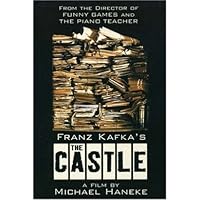
Average Reviews:

(More customer reviews)I can't speak for the wisdom of remaking FUNNY GAMES for an American audience, but that aside, Michael Haneke's films since THE PIANO TEACHER have steadily shown more daring. Haneke has attained the stature of a Welles: all of his work deserves to be seen, even his lesser work. Thanks to Kino, that is now almost completely achievable on home video.
THE CASTLE, made for Austrian TV, looks like a lot of European TV. It is shot in a much more conventional style than other Haneke films: more cross-cutting, shorter takes, more close-ups. It not only fails to give us the spatial sense of the novel, it can hardly be said to be production designed at all. Mostly, it is shot against nondescript backdrops.
Despite these constraints, THE CASTLE is an entertaining extract of Kafka's novel. It is wholly a Michael Haneke movie, while still spotlighting some aspects of Kafka that can easily get lost in the dense overgrowth of the author's prose. Among these things is the fact that Kafka, as we know from his diaries, was a fan of Chaplin. Ulrich Muhe, too old and too Gentile to be the K. of the novel, nevertheless captures the put-upon Everyman at the heart of the character. The Chaplinesque nature of K., as it turns out, was right there in the novel all along. The same goes with Dickens/Kafka connection. Simply by allowing supporting actors to show a bit of ham, Haneke keeps the proceedings lively and colorful in a way previously camouflaged by Kafka's style.
As a personal film by Haneke, everything remotely evoking psychological states or tending toward metaphor has been surgically removed. We never see the castle. We see the village once in a drawing on the door of the Inn, and that is underneath a sheet of newspaper that blows to reveal the drawing only when the door is opened. The messenger Barnabas doesn't appear all dressed in white, an important detail in the novel that motivates K. to believe he is more intimately connected to the castle than he is. He looks like what he is: the cobbler's son.
A MAN ESCAPED, by Robert Bresson (one of Haneke's acknowledged influences) is the likely model for the voice-over style of THE CASTLE. We hear the narrator relate events exactly as we are witnessing them. As with Bresson, it is an "alienation device" out of Brecht; like Bresson and Brecht, though, Haneke is, in spite of himself, too good a dramatist to keep us at arm's length for long.
THE CASTLE has previously been made into a very good film, in 1968. That version tried to smooth over the unfinished nature of the book, yet managed to capture its elliptical essence. Haneke's conceit is to dwell on the fragmentary aspects of the book, to the degree that he often cuts to black in the middle of scenes that are continuous in the novel. (!) Still and all, he has made the more accessible of the two adaptations. By fashioning his script as a twisted love story between K. and Frieda (the exceptional Susanne Lothar), he has embedded a familiar plot arc into an otherwise unresolved story. The result is an enjoyable film, and a unique critical take on one of the 20th century's great authors.
Click Here to see more reviews about: The Castle (1997)

No comments:
Post a Comment